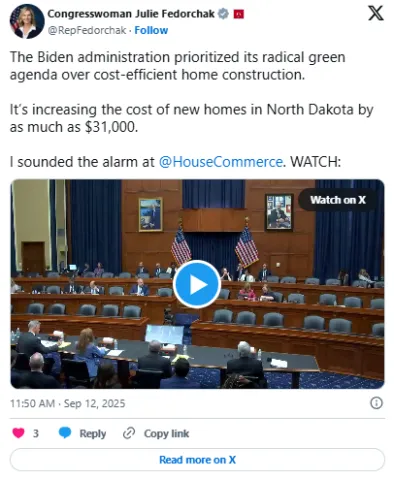Fedorchak blasts green energy agenda for skyrocketing home prices in North Dakota
Washington, D.C. — At an Energy Subcommittee hearing on affordability in appliance and buildings policies, Congresswoman Julie Fedorchak (R-ND) called out costly Biden-era federal energy code mandates for driving up the price of new homes by as much as $31,000 in North Dakota. Her questioning underscored how rush-to-green building codes are making housing less affordable in North Dakota while sidelining states’ ability to adopt standards that fit their needs.

ON EMPOWERING STATES TO ESTABLISH CODES:
Congresswoman Fedorchak: When I travel around my state, I hear from many folks that one of their biggest problems is access to housing. There are not enough new houses on the market. And then when I talk to the North Dakota Home Builders Association—which I've met with several times because this is a big issue in my state—they talked about the building codes and how inappropriate they are for our state.
The 2021 International Energy Conservation Code, according to the North Dakota Home Builders Association, can add more than $22,000 to the price of a home in my state. And in practice, the builders have estimated up to $31,000. Yet even more troubling, they tell me that it will take up to 90 years for a homeowner to get the payback for those standards. So obviously, that doesn't make any sense at all. This one-size-fits-all solution doesn't work.
Mr. Hughes, can you talk about what are some of the alternatives to this?
Mr. Hughes, Chairman of the National Association of Home Builders: Well, throwing it back to states so the states can establish their own codes, and they have that freedom now. Unfortunately, to me, the code that has been developed as a model code has been presented as unamendable. You have to take it as is, and we're a strong advocate that each state should take it and tailor it to their location and their needs, and much more of that needs to take place.
Congresswoman Fedorchak: Is there anything stopping that? What's stopping that from happening?
Mr. Hughes: Maybe education—just the fact that too many states don't realize that they can do that. Several states are doing very well: Texas, Washington, California, North Carolina. We do our own code. We have resources to do that, we have personnel in North Carolina, we have a residential Code Council, and we have full-time employees that lobby that. Too many states don't have those resources, and they're told that they can't make amendments to that code, and that's simply not true.
ON BIDEN ADMINISTRATION’S ADOPTION OF GREEN AGENDA FEDERAL STANDARDS:
Congresswoman Fedorchak: Are there other problems? The last several building code updates developed by the ICC have clearly prioritized a green agenda over cost-efficient home construction. The USDA and the VA have already adopted those latest ICC energy code standards for the homes they finance, effectively imposing these standards on those federally-backed loans. So that probably prevents or prohibits the ability of states to develop their own standards, if some of these big federal programs are requiring the ICC standards. In your view, what would be the effect on the U.S. housing market if Fannie Mae and Freddie Mac were to adopt these standards?
Mr. Hughes: Well, that's one of our greatest fears, no question. And in North Carolina, we've gone to a six-year code, and our legislation actually imposed a pause on any new energy codes until the next cycle that'll take place in 2030. If the HUD rule stays in place that eliminates USDA and VA loans, then we simply lose all of those in North Carolina. So talk about a huge limiting factor. It just won't work.